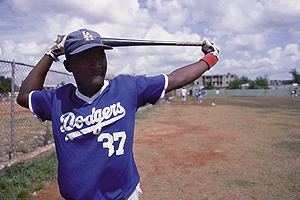Documentarians return to Chicago for festival showing retrospective of their human rights films
By Josh SchonwaldNews Office
 In a scene from The New Americans, José, an immigrant from the Dominican Republic, stretches on the ball field. Kartemquin Films released The New Americans in 2004. | |
The Human Rights Program’s annual film series, which begins Thursday, Oct. 27, will be a homecoming of sorts.
Each of the 12 documentary films to be shown in “Truth in Motion: A Retrospective of Kartemquin Films,” will be the writing, producing or editing of two Chicago alumni who started their careers nearly 40 years ago in Hyde Park.
“It just happens that several Chicago alumni are among the country’s most important documentary filmmakers,” said Maureen Loughane, Associate Director of the Human Rights Program. “And they’ve spent their whole careers focusing on important human rights issues.”
Those filmmakers are Jerry Blumenthal (A.B.,’58) and Gordon Quinn (A.B.,’65) of Kartemquin Films, both named Presidential Fellows in the Arts at the University. The capstone event of the series will be a master class on documentary filmmaking taught by the two filmmakers.
Formed in 1966 by Quinn and Jerry Temaner (A.B.,’57) and Stanley Karter, Kartemquin has produced more than 30 documentary films over the past four decades. Though best known for Hoop Dreams (1994), which has been named to more than 150 “best of” film lists, the group also has made many other critically acclaimed documentaries. Those films include Golub; Vietnam, Long Time Coming; and Stevie, which are widely regarded as masters of the social-issue documentary genre. As Roger Ebert once wrote of Kartemquin’s work: “These filmmakers have the ability to penetrate the souls of the people they depict.”
As a consortium of filmmakers, Kartemquin’s members have come and gone over the years, but one thing has remained a constant in their work: the social problem. “We’re activist filmmakers,” said Quinn. “Our goal is to make films that provoke social change.” From the beginning, Quinn said, they had a mission they called “cinematic social inquiry,” which he described as a sophisticated, philosophically rigorous methodology for using cinema verité to promote social change.
All of Kartemquin’s films have dealt with social issues, such as women’s rights, workers’ rights, the rights of the disabled and urban problems, and virtually all of the films have been based in Chicago. “The idea of Kartemquin,” said Judy Hoffman, Lecturer in Cinema & Media Studies and the Committee on the Visual Arts, who also has worked on 10 Kartemquin films, “is that you don’t have to go around the world to find human rights problems. It’s right here. You find it in local situations—race, class, gender. It all can be found in Chicago.”
“Truth in Motion: A Retrospective of Kartemquin Films” will focus on a different theme for each week’s showings. The series will kick off at 7 p.m. Thursday, Oct. 27 with a screening of excerpts of four Kartemquin films that focus thematically on “violence and power.” These will include the 1969 Hum 255 about a group of protesting students that occupied the University’s Administration building in 1968.
While this is not the first retrospective of Kartemquin’s work, Quinn said, it is the first to broadly cover their long career, giving viewers a chance to clearly see three stages of development. “During the first stage of our work, our goal to was to record reality. The idea that if we just showed reality, that would lead to change. But in our middle phase, we started to move away from the cinema verité. In films, such as Chicago Maternity Center and The Last Pullman Car, we try to weave in analysis with the verité to make our points.” In Kartemquin’s most recent work, Quinn said the films have circled back. “Now we’re using less analysis. It’s more about reaching people through an emotional intensity.”
The series also will offer a filmmaking class on Saturday, Nov. 12 in the University’s Film Studies Center. To register for the class, interested students may contact the Human Rights Program at human-rights@uchicago.edu, or register online at http://humanrights.uchicago.edu/kt.html.
Quinn said he is excited about the chance to teach his craft to Chicago students. “One of our goals has always been to inspire more people to do this kind of work.” With advances in digital technology and its accessibility, “It’s an exciting time for social activist film,” he said.
The series will conclude with a panel discussion about the role of documentary film in the United States from 1:30 to 3 p.m., in Swift Hall, Saturday, Nov. 12. James Chandler, the Barbara E. and Richard J. Franke Professor in English Language & Literature, will moderate the panel, which will feature Hoffman, Thomas Gunning, the Edwin A. and Betty L. Bergman Distinguished Service Professor in Art History and the College, and Chairman of Cinema & Media Studies, Bill Nichols, professor of cinema at San Francisco State University, and Stuart Klawans, a film critic for The Nation.
For more information, visit the Human Rights Program Web site at: http://humanrights.uchicago.edu/kt.html.
![[Chronicle]](/images/sidebar_header_oct06.gif)